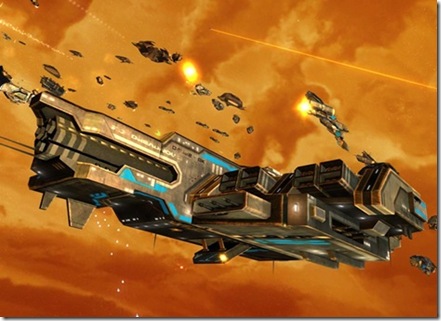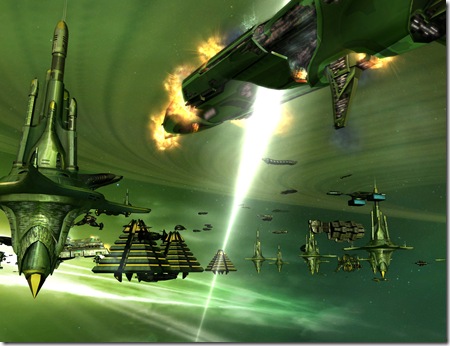Sins of a Solar Egomaniac
My list of “Things to Do” has many entries; among other things, I’d like to complete a triathlon, run 50 miles, and then do both while not dreaming. But in the foreseeable future, I have one real goal: to play an RTS (real-time strategy) for a significant amount of time.
My ongoing quest to deprecate myself has revealed a startling inadequacy. The only three RTSes I’ve ever finished are Warcrafts I & II and Starcraft. The fact that I’ve never attended a Blizzcon is more than a little startling, but I digress.
Upon noticing my lack of RTS literacy, I began a journey of introspection. The journey lead me to the depths of my soul and back, so it took about five minutes. While down there, I made a connection between RTSes and RPGs; see, both genres are prohibitive — that is to say, they’re complex to the uninitiated. But that’s where the similarities end. Accordingly, I sit on the RPG side of the wall, and so far as I can tell, not even Ronald Reagan would be much help in tearing down the divide.
RPGs, with their number-crunching character creation and intricate battle systems, can be just as complex and diverse as RTSes. So why do I love one and loathe the other? In both genres, you must take time to learn the ins-and-outs of each game within those genres. For instance, superficially speaking, Rise of Nations shares little in common with Starcraft outside of resource management. Similarly, Lost Odyssey and Mass Effect share the same engine, but that’s where they draw the line. Yet, in both genres there exists a lexicon of gameplay techniques and ideas — learned instincts, if you will — that most every game shares, but puts its own spin on. It would seem then, that during my vital mental development phases, I was exposed to the RPG, while the RTS was shunned. Where language fell in all this, I don’t know; but I talk good, right?
On multiple occasions, I’ve attempted to dig into an RTS here or there. Each time, however, I scarcely make it out of the tutorial. It really is akin to learning another language, one spoken through mouse clicks and keyboard strokes. And like a lazy high school student, I just can’t pick it up. This time, however, will be different; this time, I’ll succeed.
So what is “this time”? Well, on the recommendation of a friend, I’m playing Sins of a Solar Empire. For those who are “in the know,” this probably seems like a bad introductory RTS. But as much as I may seem like a crazy person — sometimes even muttering irrelevant asides at random times — I have a reason.
Computer Gaming World (now Games For Windows) has always been one of my favorite magazines. Each month, they run a “column” called “Tom Versus Bruce,” wherein the eponymous Tom and Bruce clash in a PC game of their choosing and then chronicle their adventures. The column is uniformly excellent, but it reaches ZOMGAwesome levels only when RTSes are involved. I mean sure, just like most other games, RTSes have their own stories and backdrops, but when multiplayer is involved, the game’s main plot ceases to be the focal point. Instead, the story of two players locked in an ever evolving war blots out all other factors. This may not sound like much — all multiplayer games do it to an extent — but in RTSes, there are so many factors to consider. So, when my friend told me about Sins of a Solar Empire‘s sometimes month-long skirmishes, I was enthralled. How’s this sound: You’re beaten back to your main planet, and all hope seems lost. An armada of enemy frigates is in mid-jump space (or slip-space) and your planet is the trampoline. But then, just failure looms imminent, an even larger armada of your own ships jumps in from way across the galaxy and saves the day. A victory that sweet is sure to give you amazing satisfaction. And diabetes.
 Sins is also extremely pretty. If it were a girl, its milkshake would most assuredly bring all the boys to the yard.
Sins is also extremely pretty. If it were a girl, its milkshake would most assuredly bring all the boys to the yard.
It was with hope for that kind of valiant struggle that I booted-up Sins. Frankly, a single word can describe the game: daunting. Complex tech trees grow from every figurative orifice Sins posseses, and their bark is nearly impenetrable. Additionally, along with normal resource gathering, you have to tax the planets under your rule. And not only do structures produce units; units produce other units. My brain just winced. The game seems like a 4X turn-based strategy, but in real-time. This, of course, gives the game a unique pacing that allows for strategies suitably complex.
All things considered, Sins seems loaded with potential. Hopefully once I move beyond the first two tutorials (say that five times fast), it’ll prove me correct.

Leave a comment